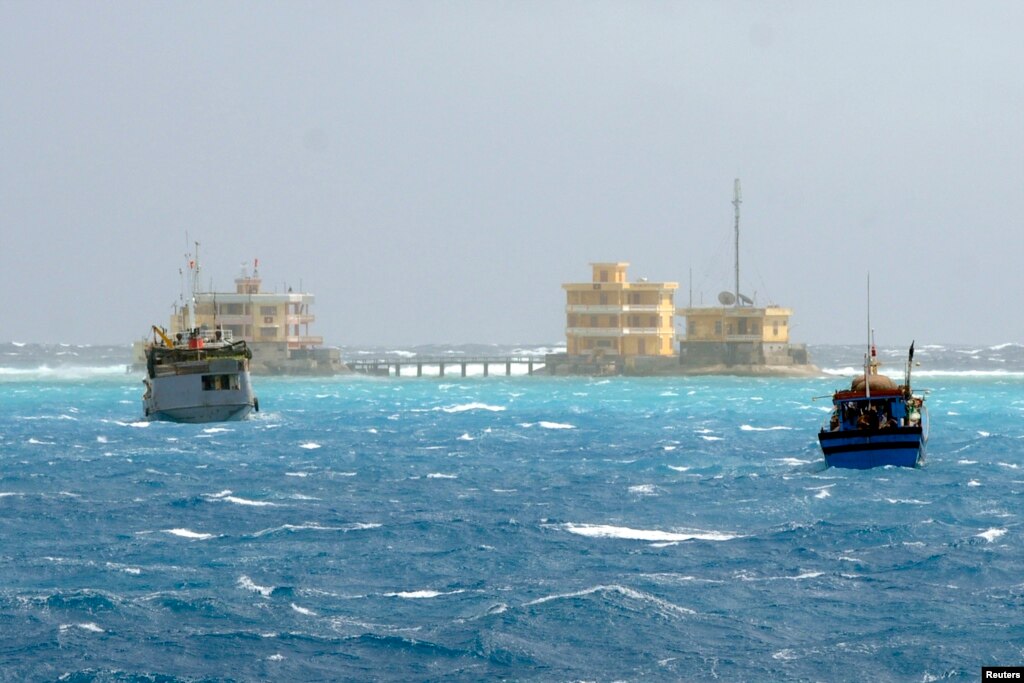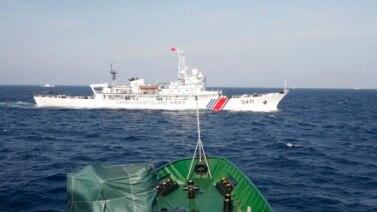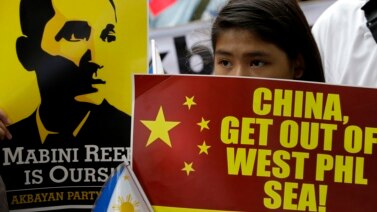
Monday, December 15, is the deadline for China to provide an argument against a Philippines legal case about Chinese territorial claims in the South China Sea. But China rejects the case before an international court and refuses to answer. At the same time, objections to China’s position are increasing.
The Philippines provided a 4,000-page paper of supporting materials for its case before the Permanent Court of Arbitration. It questions the legal basis for China’s so-called “nine-dash line” territorial claim. The area China claims covers about 80 percent of the sea. The legal paper also asks the court for guarantees on Philippines’ territorial claim. The Philippines says its claim is part of its continental shelf and well within its 370-kilometer exclusive economic zone.
Last week, a Vietnamese Foreign Ministry spokesman says that his government fully rejects China’s claim before the court. The claim was over a group of islands in the South China Sea, the Paracel and the Spratly, and the surrounding waters.
The Philippine government praises Vietnam’s position. It says the position would be “helpful in terms of promoting the rule of law and in finding peaceful and nonviolent solutions to the South China Sea claims.”
But China’s Foreign Ministry urges Vietnam to respect China's territorial independence and maritime rights and interests.
Earlier, China releases a paper to state its position in the dispute. The position paper claims that the United Nations Convention on the Law of the Sea does not address territorial dispute.
China says its claims to the sea date back 2,000 years. It argues that it was the first to “discover, name and explore” islands under dispute among China, Brunei, Malaysia, the Philippines, Taiwan and Vietnam. China also has said repeatedly that it has the right to ignore legal cases on issues related to sea borders.
A Philippine foreign affairs spokesman said this about China’s position, “The arguments raised by China are not new anymore. We know them and we have answered those arguments in the memorial we submitted.”
Carl Thayer is an Asia security expert at the Australian Defense Force Academy. He says that China is making an appeal to the tribunal by releasing its position paper, although it is avoiding official court action.
“To a certain extent it will be welcome by some of the judges because at least they have, they now know, a little bit more about what China’s claiming.”
Mr. Thayer says the judges also will look at a study that the U.S. State Department released several days before China’s position paper. The U.S. says it is neutral on territorial disputes. But, the study examined the basis for China’s nine-dash line. The study found the claim has no basis in international law.
Myron Nordquist is associate director at the Center for Oceans Law and Policy at the University of Virginia. He thinks the tribunal will rule that it does not have the legal power to consider the case.
“When they (China) opted out, they opted out of- and the language, the text for the Convention says- ‘disputes involving historic title’… [So] this does involve, however unsustainable a claim there is… that does involve an argument for historic title.”
Mr. Nordquist says if the tribunal cannot consider the case it will result in compulsory conciliation. That means the Philippines and China would have to talk about the dispute with a neutral third party. However, neither country would be required to carry out any action the third party might advise.
Mr. Nordquist says if the tribunal decides it does have legal right to try the case, it could order a decree. However, China could veto that decree as a member of the U.N. Security Council.
I’m Caty Weaver.


